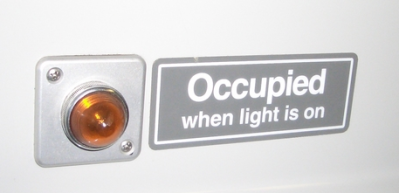My trip to the Supreme Court of the United States yesterday to see the Grokster v. MGM oral arguments was eye-opening in a number of respects. Although seeing the arguments was very exciting, the overall experience was incredibly disenchanting. I do not intend to return to the court for oral arguments.
Perhaps naively, I had bought into the idea that the judiciary — and the Supreme Court as its highest representative — is somehow above the normal buying and selling of favor and political power that goes on in Washington. I thought that the court had the potential to be pro-public in a way that money and party politics had made impossible in the legislative and executive branches. I’ve changed my mind.
At least in a sense, the Supreme Court is actively and aggressively anti-public. The court doesn’t want the public in the court room. They don’t want the public exposed to their ritual and processes in any other ways ways except at a delay and or highly mediated. In my opinion, they are easily the least transparent branch of US government and, perhaps most disconcertingly, even their small overtures toward public involvement are just as much for sale as everything else in Washington DC.
Yesterday and the day before, people traveled from all over the country to Washington DC to sleep on the ground with the chance of getting one of the 210 seats (50 of which were reserved for the public we were told) in the room where Grokster would be argued. Less a dozen — maybe closer to half dozen — of the people with me on the ground that night got into the court. There are two major reasons.
The Public Comes Last — But Mostly Not At All
There are 210 gallery seats in the Supreme Court. Supposedly, 50 are reserved for the public but in reality, even these are up for grabs by VIPs. Basically, everybody who is not the public gets a chance at those seats before the public does. That includes: members of the press, members of the Supreme Court bar (basically any lawyer whose practiced for a few years and jumped through a few hoops) and friends of the court: an impossibly broad distinction that seems to boil down to a very long list of rich and powerful people. This means that Jack Valenti can waltz right in 20 minutes before things start while the guy who slept there all night gets turned away.
To make matters worse, the Supreme court batches business in a way that packs the room unnecessarily. The court began by admitting new lawyers to the Supreme Court bar. This basically entails reading the lawyers’ names out and then asking the group to stand at once. Each of these lawyers (and there were several dozens) gets to bring four friends and family members to their big day in the court. This is reasonable. But there is no pause before the arguments so each of those family members takes up one of the precious few seats. It is really necessary to organize these hearings in a way that takes seats away from the public who are interested in seeing a case being argued and gives them to lawyers family members who often don’t care?
Finally, when the public doesn’t get in, they simply don’t get access to the information. CSPAN cannot broadcast the court in progress and nor can anyone else. Transcripts and recordings are taken real-time but are not released for months after the court is over. There is no overflow room with closed circuit video or audio and it would be trivially easy to make one. As it stands, you either get in or you don’t. If you are Jack Valenti, you always do. If you are the interested public with less money and political sway, it almost always means that you don’t.
Line Sitters
By midnight last night when I arrived, there were more than 50 people in line. The majority of these (the vast majority probably) were professional line sitters. It may sound silly but it has evidently become the rage for the well heeled in Washington to get into congressional hearings and — on some nights the Supreme Court as well — by hiring someone from a professional line standing company to stand in line for them overnight.
Call it market efficiency, but the reality of the situation is that those spots reserved for the public are bought and sold just like everything else in Washington. If you happen to be part of that unfortunate majority of the country’s population that has to work a job to pay the bills — but not the kind of job that pays well enough that you can afford to hire a USD 8-35/hour line stander, you will probably not get in in the Supreme Court to hear a popular case.
In the early morning, the nice group of South Asian line-sitters in front of me were replaced by well rested and well dressed MGM and Time Warner executives. While the hirers were almost all industry people, a few folks from the Grokster and Streamcast boards got in using a similar tactic. I arrived after the line had grown past 50. That was generally interpreted to mean that I wouldn’t get in. As a result, I made the somewhat conflicted decision to pay an entertainment industry line sitter who was, as Seth Schoen put it, "not very good at his job," 50 USD to send him home to his bed and to send me to his little patch of concrete. Matt Norwood, who arrived with me and took up the next place in the line was the third person to not get into the court.
General Feelings
It would be simple to set up closed circuit video as they do in the Vatican. It would be simple to release the transcripts that are already written or to broadcast arguments. But it doesn’t happen. The few spots that exist go everywhere but to the general public.
As far as the line sitters go, you can call it a market responding to a need but that doesn’t make me feel any better. I’m not bitter — I got in. However, I am upset that most of the folks who slept on the concrete with me did not. More than half of the folks on the ground who would have got in packed up and went home when their "worms" showed up or their contracts expired. The larger portion of campers were simply turned away at the door.
I understand that the Supreme Court doesn’t want to become part of public life in the same way that other parts of the government are but I think their current behavior goes well beyond that. The court goes out of its way to block any public participation or direct public monitoring of the process. The market (no more than a euphemism for the richest and most powerful) safely snatches up any of the scraps that the court throws to the unwashed hordes.
This is the reality of Supreme Court. Maybe that’s OK and maybe it is not. I only ask that we not not pretend it is any different or any better than this.

